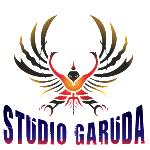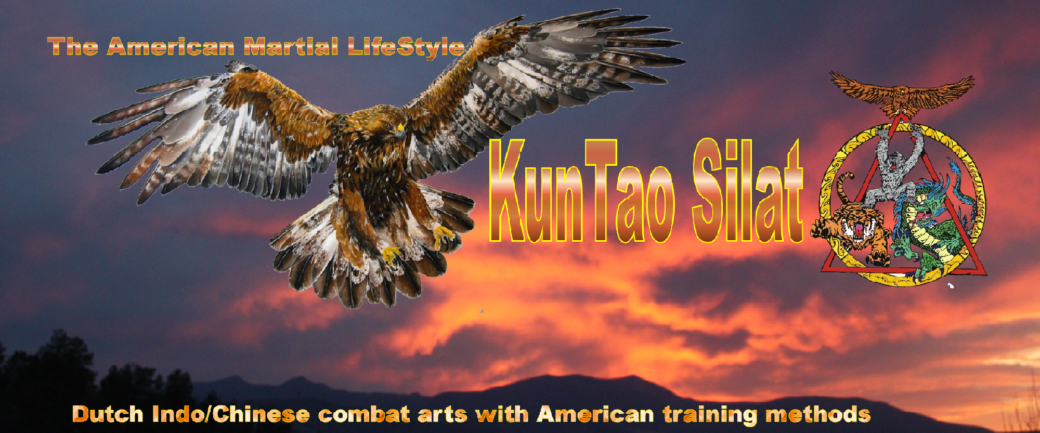Welcome to KunTao Silat ~ the American Martial LifeStyle › Forums › General Category › Questions › Written Curriculum
Tagged: betawi, Chas Clements, glossary, KTS, Malabar
- This topic has 13 replies, 6 voices, and was last updated 9 years, 3 months ago by
Mark.
-
AuthorPosts
-
-
September 10, 2015 at 2:05 pm #3976
Mark
ParticipantHello, are there any wrriten sources of the curriculum anywhere. Thank you. I was going to make one otherwise….
-M
“There is Beauty in Brutallity”
-
September 12, 2015 at 9:44 am #3977
 JoshuaParticipant
JoshuaParticipantHi Mark. I’ve also just started learning this art in the last 5 months or so. I have not seen a written cirriculum (other than the 2 sub-style breakdowns under “LEARN KTS” above on this website).
But, I have found this glossary written by my Guru’s teacher, Chas Clements:
This was very handy for me to get up to speed on KTS terms.
-
This reply was modified 9 years, 3 months ago by
 Steve. Reason: wrong URL
Steve. Reason: wrong URL
-
This reply was modified 9 years, 3 months ago by
-
December 4, 2015 at 3:35 pm #4164
 SteveKeymaster
SteveKeymasterAnd now my input:
Level One
5 Stances
8 Serak Djurus
Cabin LegSets
Turning Djurus with applications
Triple Hitter Exercise
AKTS Class WarmUpLevel Two
Djurus Satu with applications
MonkeyFoot training drillLevel Three
Lankas Dua with applications
Sticking Hand drillLevel Four
Chang KTS Stances
Breathing in movement
Demonstrate Internal Mechanics {IM}Level Five
I Shing Po with IM
Golden Free FormLevel Six
PoQua Zen with IM
OrangutanLevel Seven
Refine all Forms
Chang Style applications from all forms
Guru Mudas present class videos-
December 14, 2015 at 8:56 pm #4182
Steven Vance
ParticipantI’m quite excited at the changes I see in the AKTS curriculum. I’ve always thought Serak should be positioned earlier and I’ve been hoping more of Bill Chang’s material would find its way into the art. Are there DVD’s to look forward to?
Some questions –
1) The 5 Stances? The long stance form has a lot more than 5. Where can I find info on this?
2) Is the Golden Free Form the same as the Tai Keah form on one of the DVD’s?
3) Where will I find material on the Orangutan?Sorry I’ve been mostly out of touch. Its been crazy at my house. We moved my mother in with us early last November, only to have her pass four days later. A little after that our younger daughter finalized her divorce and moved in with us, bringing her baby daughter. Then my wife lost her mom, an aunt, and her dad in about a five week period in the late Spring. At the memorial for her parents her younger half-sister died in the church parking lot from an accidental overdose. She was troubled and it is complicated. We’ve been adjusting to all of this and feel like we are finally coming out of the worst of it.
I hope this holiday season finds everyone well and I look forward to being more present now.
Steven Vance
-
-
December 19, 2015 at 9:18 am #4196
 KuntaoerParticipant
KuntaoerParticipantSteve,
My condolences. Reminds me of the old admonition to respect everybody because you do not know what struggles they face.There is material in the works on the Chang style training as well as some deep dives on different material.
The Golden Free Form is a take on the Tai Keah material – good eye.
Best,
Joe-
December 19, 2015 at 11:38 pm #4203
Steven Vance
ParticipantThanks. The whole thing seemed sort of surreal while it was going on. Like some weepy Hallmark special or something. We just haven’t reached the ending yet, where we find the pot of gold to reward us for getting through it all…lol.
I’m glad to hear their is more material coming, especially from Bill Chang’s teachings.
The info about how you structure your teaching is good stuff. Are the ‘Monkey Foot 1-8’ and ‘Monkey Stepping’ the same as the ‘Monkey Foot stepping drill’ that Steve listed above? Where would I find the info in the DVDs on that? I seem to recall monkey stepping drills in the ‘Basics’ dvd, but I don’t know that it was broken into numbered segments.
What about the tiger and dragon stepping? And the Orangutan material for level six?
Thanks again,
Steven
-
-
December 19, 2015 at 9:25 am #4197
 KuntaoerParticipant
KuntaoerParticipantIn my clubs the art is broken down into phases –
Phase 1 features the complete stance set and tiger, dragon, monkey stepping
Kendang Djurus-Djurus 1-3 (Turning Djurus 1 & 2, 3)
Some additional pukulan djurus-djurus just because it is easy to apply. A total of 8 short ‘hand sets’
Some additional warm up exercises and basic kicking drills.
Walking the Tiga (Sapu/turn/beset)
Monkey Foot 1-8
Plus application off of the initial Djurus.
To this right, it usually takes about 12-18 months based on how often the student gets to class.
At this stage, one is formerly considered a student. And work begins on the Kendang sequence of Satu, Dua and Tiga. This usually takes 2-3 years to complete including the weapons work that goes into it. The breakdown is extensive.
More to come…
-
December 19, 2015 at 11:29 am #4198
 KuntaoerParticipant
KuntaoerParticipantI might add, just memorizing movement does not count.
-
December 19, 2015 at 12:52 pm #4199
 KuntaoerParticipant
KuntaoerParticipantFor students earning from the distance program, I often suggest that they start with the Kilap Betawi/Serak material Chas shows. This is easier to understand and practice. While doing this, work the legwork and handwork sets until your eyes bleed. You will learn good, fast self defense, while ‘Gartinizing’ your body to be able to understand the movement style in this school of Kuntao Silat. This is not the ‘only’ way to do it, but if you are unfamiliar with Pak Gartins unique method, it helps get you onto the path with less wrong turns on the way.
-
December 20, 2015 at 6:58 am #4205
 KuntaoerParticipant
KuntaoerParticipantSteve,
Yes, it is the Monkey Foot drills taught by Pak Steve, with some additions drawn from the material itself. The numbering is just a convention developed in my club to keep things straight in our heads/make it easier to teach. I’ll be shooting video of it after the first of the year for the member site – as Pak Steve thinks it would be helpful.It is just the different combinations of upper/lower art positions and entering depths. I start with eight positions, then each one has different depths of application.
Dragon and Tiger walking are in the legwork set videos. Orangutang – that I always saw as an ‘idea’ – you can see Pak Steve perform it as well as Pak Chas on the old Djurus Satu 2000 video, as well as on clips on the member site – one is labled Orangutan, I think. Orangutan is also sometimes called just ‘ape’ – it is the long arm, long range condensing to close range application. Rooted of course, in some of our basic exercises.
-
December 21, 2015 at 1:47 am #4206
Steven Vance
ParticipantAhh…okay. I’ll look forward to seeing that material next year. I think I remember seeing an outline of foot positions that would pertain to that on a de Thouars’ related website. It wasn’t given in that context, but now it makes sense. Thanks!
For some reason I thought the dragon and tiger walking were some kind of stepping methods I hadn’t noticed – like tiger stepping in muay Thai, the bear stepping in baji quan, or the mud-wading step in bagua zhang. I think I was pigeonholing the legwork material as ‘stances’ in my mind…lol. If it was a snake it would have bit me…
I didn’t remember a specific orangutan form, but didn’t know if I’d missed it. That makes sense. I do have Richard Clear’s dvd showing an ‘orangutan’ technique/attitude, as well as another one from William Sanders’ cimande. It caught my attention – I’m a big guy and the long arm ‘ape’ material makes a lot of sense for me. I also have a tongbei vcd I bought from China a couple of years ago that shows a bunch of long arm ‘ape’ throws and standing grappling that comes from the same basic moves that are in Djuru/Langka Dua.
Thanks for taking the time to answer. Happy Holidays!
Steven
-
February 10, 2016 at 5:12 pm #4391
John
ParticipantThanks everyone for your input so far. Pak Steve, I see that it’s the American curriculum you’ve provided. How about the Malabar KTS curriculum? It’s my understanding that the first two levels are the same as American…
-
February 10, 2016 at 5:39 pm #4392
 SteveKeymaster
SteveKeymasterYes, John they are the same material used in a slightly different way.
For instance both Djurus Satu and Lankas Dua are performed in a slightly different way in American than in Malabar. From there the systems’ branches grow farther apart.
The American life style is considerably different than the life style in Indonesia was before the Second World War, so we consider the principles learned from the Indonesian war arts and apply them to our modern Martial LifeStyle with the focus on keeping the martial content intact.
With the video capability we are just now bringing on line, we will be able to cut out and name just about every movement in every form and technique. So the written curriculum is just now beginning.
Let’s talk about it!
-
February 13, 2016 at 9:49 am #4409
Mark
ParticipantAwesome, thank you all for your input.
-
-
AuthorPosts
- You must be logged in to reply to this topic.
Share this:
- Click to share on Facebook (Opens in new window) Facebook
- Click to share on X (Opens in new window) X
- Click to share on LinkedIn (Opens in new window) LinkedIn
- Click to email a link to a friend (Opens in new window) Email
- Click to print (Opens in new window) Print
- More
- Click to share on Pinterest (Opens in new window) Pinterest
- Click to share on Reddit (Opens in new window) Reddit
- Click to share on Tumblr (Opens in new window) Tumblr
- Click to share on WhatsApp (Opens in new window) WhatsApp
- Click to share on Pocket (Opens in new window) Pocket
- Click to share on Telegram (Opens in new window) Telegram
